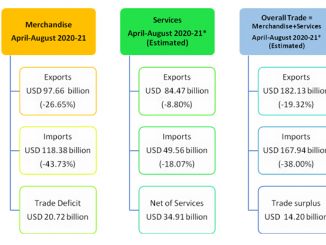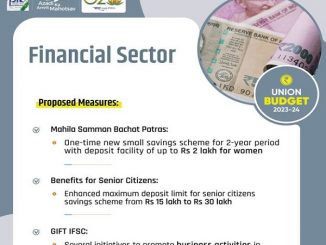
Feb 01: The services sector witnessed a swift rebound in FY22, growing Year-on-Year (YoY) at 8.4% compared to a contraction of 7.8% in the previous financial year, highlighted the Economic Survey 2022-23, tabled by the Union Minister for Finance & Corporate Affairs, Smt Nirmala Sitharaman in Parliament today. This swift rebound was driven by growth in the contact-intensive services sub-sector which registered sequential growth of 16% driven by the release of pent-up demand, ease of mobility restriction, and near-universal vaccination coverage. “India’s services sector is a source of strength and is poised to gain more. From low to high value-added activities with export potential, the sector has enough scope to generate employment and foreign exchange and contribute to India’s external stability”, noted the Survey.
As per the First Advance Estimates, Gross Value Added (GVA) in the services sector is estimated to grow at 9.1% in FY23, driven by 13.7% growth in the contact-intensive services sector. The Survey highlighted that PMI services witnessed an uptick and expanded to 58.5 in December 2022, following an overall easing of retail inflation leading to retreating price pressures of inputs and raw materials.
Bank Credit
The Economic Survey observed that the bank credit to Services Sector saw a YoY growth of 21.3% in November 2022, the second highest in 46 months, with the improvement in vaccination coverage and recovery in the services sector. Within the sector, credit to wholesale and retail trade increased by 10.2% and 21.9% in November 2022, respectively, reflecting the strength of the underlying economic activity. “Credit to NBFCs grew by 32.9% as NBFCs shifted to bank borrowings because of high bond yields”, stated the Survey.
Services Trade
The Survey observed that India’s services exports may improve as runaway inflation in advanced economies drives up wages and makes local sourcing expensive, opening up avenues for outsourcing to low-wage countries, including India. “India is a significant player in services trade, being among the top ten services exporter countries in 2021”, noted the Survey. Services exports registered a growth of 27.7% during April-December 2022 as compared to 20.4% in the corresponding period last year. Among services exports, software exports have remained relatively resilient during the Covid-19 pandemic as well as amid current geopolitical uncertainties, driven by higher demand for digital support, cloud services, and infrastructure modernisation catering to new challenges.
Foreign Direct Investment (FDI) in Services
The World Investment Report 2022 of UNCTAD places India as the seventh largest recipient of FDI in the top 20 host countries in 2021. India received the highest-ever FDI inflows of US$ 84.8 billion including US$ 7.1 billion FDI equity inflows in the services sector in FY22. “To facilitate investment, various measures have been undertaken by the Government, such as the launch of the National Single-Window system, a one-stop solution for approvals and clearances needed by investors, entrepreneurs, and businesses”, mentioned the Survey.
Sub-Sector-Wise Performance
IT-BPM Industry
The Survey noted that the IT-BPM revenues registered YoY growth of 15.5% during FY22 compared to 2.1% growth in FY21, with all sub-sectors showing double-digit revenue growth. Within the ITBPM sector, IT services constitute the majority share (greater than 51%). Exports (including hardware) witnessed a growth of 17.2% in FY22 compared to 1.9% growth in FY21, owing to the increased reliance of businesses on technology, the roll-out of cost-reducing deals and the use of core operations. The industry recorded nearly 10% estimated growth in direct employee pool in FY22 with a highest-ever net addition to its employee base. “India’s massive digital infrastructure played a crucial role in driving technology adoption, with public digital platforms becoming the bedrock of India’s digital advantage”, stated the Survey.
E-Commerce
According to the Global Payments Report by Worldpay FIS, India’s e-commerce market is projected to post impressive gains and grow at 18% annually through 2025. The Government E-Marketplace (GeM) attained an annual procurement of ₹1 lakh crore within FY22, representing a 160% growth compared to last FY. Initiatives taken by the Government for the promotion of e-Commerce, including the Digital India program, UPI, One District – One Product (ODOP) initiative, Open Network for Digital Commerce (ONDC) etc., have been major contributory factors to the growth of E-commerce in recent years.
Tourism and Hotel Industry
The Survey noted that with travel restrictions and health concerns subsiding, tourism has become a vital driver of a strong upswing in contact-intensive activity. The entire aircraft movement in the country increased by 52.9% YoY between April and November 2022 as India resumed all regular international flights at full capacity towards the end of 2021-22. With the waning of the pandemic, India’s tourism sector is also showing signs of revival. India is ranked 10th out of the top 46 countries in the World in the Medical Tourism Index FY21 released by Medical Tourism Association. “Recent initiatives like the Ayush visa for tourists who desire to visit India for medical treatment, the launch of the National Strategy for Sustainable Tourism & Responsible Traveller Campaign, the introduction of the Swadesh Darshan 2.0 scheme, and Heal in India can assist in capturing a larger share of the global medical tourism market”, observed the Survey.
Real Estate
The Economic Survey stated that notwithstanding the current impediments, such as rising interest rates on home loans and an increase in property prices, the sector witnessed resilient growth in the current year, with housing sales and the launch of new houses in Q2 of FY23 surpassing the pre-pandemic level of Q2 of FY20. “The recent government measures, such as the reduction in import duties on steel products, iron ore, and steel intermediaries, will cool off the construction cost and help to check the rise in housing prices”, mentioned the Survey. According to JLL’s 2022 Global Real Estate Transparency Index, India’s real estate market transparency is among the top ten most improved markets globally. The Survey stated that regulatory initiatives such as the Model Tenancy Act and digitisation of land registries & market data through the Dharani and Maha RERA platforms have helped to broaden the market and bring more formalisation to the sector.
Digital Financial Services
The Economic Survey stated that digital financial services enabled by emerging technologies and innovative solutions were accelerating financial inclusion, democratising access, and spurring the personalisation of products. India took the lead with the fintech adoption rate of 87%, substantially higher than the world average of 64% as per the latest Global FinTech Adoption Index. The Survey stated that Neobanks have eased availability and provided access to financial services to MSMEs and underbanked customers and areas. The introduction of Central Bank Digital Currency (CBDC) will also significantly boost digital financial services. “Digitalising documents has also played a pivotal role in giving further impetus to digital financial services”, stated the Survey.
Outlook
The Survey noted that India’s services sector growth which was highly volatile and fragile during the last 2 fiscal years, has shown resilience in FY23. The prospects look bright with improved performance of various sub-sectors like Tourism, Hotel, Real estate, IT-BPM, E-commerce etc. “The downside risk, however, lies in the external exogenous factors and bleak economic outlook in Advanced Economies impacting growth prospects of the services sector through trade and other linkages”, mentioned the Survey.
Disclaimer: We donot claim that the images used as part of the news published are always owned by us. From time to time, we use images sourced as part of news or any related images or representations. Kindly take a look at our image usage policy on how we select the image that are used as part of the news.


